- Home
- Linda Lael Miller
Country Strong--A Novel Page 8
Country Strong--A Novel Read online
Page 8
He’d lit the stove, and the pleasant scent of woodsmoke rode the breeze, too. Cord smiled to himself. Plenty of folks still chased off the early-morning chill—even in summer—by lighting a fire in a cast-iron stove, and he found that comforting.
He set aside his reheated coffee—he’d make a fresh batch when he was through with his chores—and headed for the barn.
The dogs gamboled alongside, delighted with themselves, with life in general.
Cord grinned, watching them.
Take a lesson, cowboy, he told himself. You’re alive and on your feet, and that’s reason enough to be happy.
He spent forty-five minutes with the horses, talking to them as he worked—filling the feeders, making sure the automatic waterers were operating, doing a little grooming as needed. He told them about Carly and how they’d meet her, and about the new client who’d be arriving soon. Some of the other local ranchers would no doubt consider him a bit touched in the head, carrying on lengthy conversations with horses, dogs and even the occasional bird.
Finally, he turned four of them out for the day. The remaining two included a Thoroughbred gelding named Chief with a serious attitude problem; Chief was now his. So was a shaggy little black-and-white mare, a pro bono case brought to him by a volunteer with an animal rescue group just two weeks before.
He’d named the mare Annie, and every time he thought of her, another crack opened in his heart. She’d been abandoned, turned loose to fend for herself, and she’d had a rough time of it out there all alone; she was scarred and slat-ribbed and her hooves had grown out, then split.
Annie was still terrified of everything—the other horses, the dogs and Cord himself. Now she huddled in a corner of the stall, hide quivering, and stayed well back from the feeder.
He’d trimmed her hooves when she’d first arrived, washed her down and applied salve to her wounds, and she’d borne his attentions meekly, shrinking from every touch of his hand.
He would get through to her, no doubt about it, but the process was going to take a while. He’d officially adopted her, which was how he’d gotten three of the four horses he owned. Rebel, his sorrel gelding, was the only one of the bunch who’d had a good start in life—he’d been born and bred right there on the ranch, near the end of Bill Hollister’s working days.
For a while after Cord’s grandfather died, Rebel was the only horse on the place. With Cord away at college, finishing his last year, Bill had found new homes for all the others and he’d stopped taking on extras to train or just redeem.
That summer almost thirteen years ago, when Cord was about to begin a veterinary studies program, Bill had suffered a heart attack and died in his sleep, leaving Mimi almost catatonic with shock.
Cord hadn’t been in much better shape than his grandmother, and even Rebel, a yearling at the time, had seemed to feel the loss. Bill had spent a lot of time with that colt, and it had been heartbreaking to see the animal standing at the pasture fence, watching for his friend to come out of the house.
Cord had decided to stay home instead of attending veterinary college, to keep the ranch going and look after Mimi, who was never the same after losing her husband. Mimi had died almost six years later, and despite an autopsy, cause of death was never established with certainty. Cord had always believed that grief was the reason.
The horses were a large part of what had helped him get through his own grief. The hours had been long, the work hard, but Cord had never minded those things; Bill had taught him well.
He’d worked with Rebel, using the techniques the old man had taught him, and coming up with a few of his own. Without that horse, and plenty of support and encouragement from Eli—J.P. was still in the military then—Cord thought he might have lost his way.
Word had gotten around. Cord Hollister, people said, had a way with a problem cayuse, just like his granddad, and then they started bringing him their misfits to train, some of them valuable, some simply beloved. Their troubles ranged from simple things, like an animal that refused to take the bit or accept a saddle or cross a creek, to serious cases of trauma, such as abuse, injury and neglect.
As his reputation grew, so did his business. Within two years, Cord was not only working with equine outlaws on the ranch, he was traveling all over the country to work with prized race horses, jumpers and the like.
Thanks to popular demand, he’d begun holding clinics and teaching his methods, and he was good at it. Recently, he’d also contributed to some therapy training when requested and found it immensely satisfying, especially after observing J.P.’s positive experience with Trooper. The right horse, like the right dog, could be a lifesaver in more ways than one.
He was no extrovert, far from it, but he soon discovered that he liked teaching owners and aspiring trainers almost as much as he liked spending time with their horses. He admired men like Monty Roberts and Buck Brannaman and had studied with both of them, even after he had students of his own.
Now here he was, an acknowledged expert, with all the work he could handle.
Sometimes, it still surprised him.
More surprising yet, he’d never once regretted not going back to school and becoming a veterinarian.
He had a special affinity for all animals, but especially for horses, and at times, he felt it bordered on the mystical.
He spoke gently to the little mare, who was still keeping her head down and her hind end pressed against the far wall. Mentally, he joined his heart to hers.
“You’re gonna be all right from now on, Annie-girl,” he said. “You have my word on that.”
CHAPTER FIVE
TINA WALKED INTO the kitchen and marched straight to the coffee maker.
She was wearing her bathrobe over a pair of cotton pajamas, there were fluffy slippers on her feet, and her head bulged with pink foam curlers.
She helped herself to coffee, gently hushed Bandit and Smoky, and joined Cord at the table, motioning for him to sit back down as she settled herself in the chair to his right.
“Is something wrong?” Cord asked. He’d never seen Tina dressed—or not dressed—like that, let alone with curlers in her hair and her face bare of makeup. “Mitch is okay?”
“Mitch is fine, and so is Carly, not that you asked about her,” Tina replied, sounding a shade terse.
“I was about to!” he insisted.
“I’m here because I might not have a chance to talk to you once the day gets started, what with your chores and the new client coming and all.”
Cord wasn’t all that reassured since Tina could have called him. Under different circumstances, the pajama tableau might have seemed amusing, but he’d begun to feel a little anxious. “Is this about Carly? Did something happen?”
“No,” Tina answered, sharpening the word to a fine point. “Nothing happened. The poor girl took a hot bath last night, crawled into bed and fell asleep right away. In fact, she’s probably still sleeping.”
“Did she tell you anything?”
“No,” Tina repeated. Maybe the coffee was mellowing her out a little. “But she did tell me, before her bath, that it would be all right if I washed some of her clothes. I asked her first, of course.”
“Tina. What’s the problem? Is there a problem?”
“This coffee is terrible,” Tina said, before going back to the pot for a refill.
“Damn it, Tina,” Cord growled once she sat down again. “What are you getting at?”
Tina sniffed, as if she’d taken offense, then relented. Slightly. “Everything that child owns is in that awful backpack of hers. I had to open it if I was going to do her laundry, didn’t I?”
Cord said nothing.
“Anyway, Carly needs new clothes. Especially underwear.”
“Is that what you came here to say? That Carly needs some decent clothes? Hell, I could have told you that last night. You saw what
she was wearing!”
Tina puffed up with annoyance. “Will you just shut up and listen, Cord Hollister? Or are you going to keep interrupting me?”
Cord drew a deep breath, let it out slowly. Relaxed his shoulders. “I’m listening,” he said, pleasant as could be.
He’d just remembered that J.P. had invited himself and Eli to supper tonight. They were supposed to make a plan regarding Carly.
He’d told J.P. to bring food, but that didn’t mean he would. Cord figured he’d have to prevail on Tina for help with the barbecue supplies. Before he could mention it, though, she returned to their original discussion.
“I found something in Carly’s backpack, Cord,” Tina said. “Besides ratty underwear, two pairs of jeans that probably came from a thrift store and a couple of T-shirts.”
“What?” Cord demanded. His imagination was in overdrive—he pictured Tina coming across drugs, or the paraphernalia to use them.
“Money,” Tina almost whispered. “A lot of money. In a roll with a rubber band around it. And I’m talking larger bills. Twenties, fifties and up.” Coffee forgotten, she shaped her hands to indicate something about the size of a baseball. “And one of those ultrathin laptops, the kind people wait in line all night to buy. How could she afford something like that, Cord? She didn’t even have food in that backpack, or a toothbrush.”
“Maybe the bankroll used to be thicker,” Cord said, thinking about that expensive laptop. He wasn’t trying to be funny, which was a good thing since nobody was laughing, including him.
“There’s probably a reasonable explanation,” Tina said weakly.
“Right,” Cord said, pulling his phone from his shirt pocket.
“What are you doing?”
“Calling Eli.”
Tina blinked, clearly confused, and Cord realized he hadn’t told her anything about Carly, beyond the fact that she’d needed a respectable place to spend the night.
He returned the phone to his pocket. “According to Carly,” he began, “her mother was someone J.P., Eli and I knew, way back when—and I say was because she died a couple of years ago.” He paused at the sorrowful expression on Tina’s face. “Do you remember a girl named Reba Shannon?” he continued. “She worked at the Painted Pony Motel for about six months, including the summer after we graduated from high school.”
“Vaguely,” Tina said. Then added, “Not really.” A moment later, “The Painted Pony Motel?”
“Yes,” Cord replied, with exaggerated patience.
Tina looked mildly puzzled, then horrified.
Even back in the day, the joint had been something of a rathole, and not many people stayed there, except for low-life types passing through on their way to somewhere else. Or “guests” who wanted a cheap—really cheap—place for a night or two. Or those who didn’t know better. The more discerning ones probably chose to sleep under a tree instead or got themselves tossed in jail for a couple of days. At least there, they could count on clean bedding and a decent meal.
So how had Norm and Della Schafer, a pair of drunks, scraped up the money to pay Reba to clean rooms? Why had they needed anyone to clean rooms, when they certainly didn’t have a lot of regular or long-term guests to mess them up?
“I remember now. She was the girl you and Eli and J.P. got into that big fight over—Reba, I mean—and the three of you stayed mad at each other all the way to Christmas.” Tina was tapping her lower lip with the tip of an index finger, thinking hard. “And I remember those poor children. Russ and Bethanne and—wait, it’s coming back to me. The younger one...”
The name, long forgotten, came to Cord’s mind instantly. “Shallie,” he said, with a strange pang of—what? Sadness? Regret?
“Yes,” Tina said. “That’s it. She was Della’s niece, I think.”
Cord nodded. “Sounds right,” he said, wondering about the girl he’d barely known during her teenage years—and his. She’d been part of his group of friends when they were kids; later, in high school, she’d become an outsider, always on the fringe, but not because the others rejected her. No, Shallie Fletcher hadn’t been shunned or bullied. She’d turned into a sulky, obstinate little rebel in those days, spoiling for a fight. With anybody, about anything.
He’d never really understood why. Was it Reba’s influence? He suspected now that Shallie had felt both jealous of Reba and, at the same time, connected with her in that best-friends way.
She’d appeared on the scene when he and Shallie were in twelfth grade. He’d fallen almost instantly for Reba, and lost all awareness of any other girl. Including Shallie.
Until the night she’d suddenly confronted him with avowals of undying love.
He’d been stunned by the outburst, stricken to silence. And turned his face away from her attempted kiss.
Still raw from Reba’s betrayal and the loss of his two best friends, the friends he’d counted on, he wasn’t ready for this, for Shallie, for anyone.
Shallie wasn’t unattractive; she might have been really pretty, in fact, with her compact, shapely body, good skin, thick chestnut hair and large, luminous brown eyes, but by that stage she was doing everything she could to play down her best features. Worn too much makeup and ugly, oversize clothes, boots more suited to a lumberjack than a seventeen-year-old girl. Not to mention the fuck-you attitude and the force field it created.
She’d looked very different that night, he remembered, although he hadn’t noticed at the time. He’d only registered her blue cotton sundress, goo-free face and clean, carefully styled hair later on, much later, when he’d gained some perspective.
Sitting at his table with Tina, he recalled now that he’d tried to be kind but he’d hurt Shallie. Hurt her badly. He knew that. That was the thing about telling the truth—it might be right, but it could also do harm.
She’d left town soon after, and Cord hadn’t seen her or thought about her since.
A possibility ran swiftly through his mind. An unlikely one, but... He’d just come across the name Fletcher. His new client. S. Fletcher. It couldn’t be. Could it?
“Hey,” Tina said, snapping her fingers an inch from his nose. “Where were you just now?”
“Remembering a few things,” he answered. He’d been doing a lot of that lately, and it was starting to worry him.
Tina’s face softened as she regarded Cord. “Like what?”
“Never mind,” Cord replied. “Did you ask Carly about the money and the laptop?”
“Of course I didn’t. I had no business snooping through her stuff. I said I’d do her laundry, not invade her privacy.”
“Her privacy,” Cord repeated. “But if we’re going to figure out what’s going on with her, if we’re going to help her, we need more information than she’s been willing to give us so far.” He paused, considering. “Suppose Carly wanted you to see what was in that backpack? Why else would she have let you near it?”
“I didn’t think of that,” Tina admitted. She looked so serious, and so funny in that crazy getup, Cord had to suppress a laugh.
“If I ask any questions, she’ll know I snooped. She’d never trust me after this. She might even run away.”
“Or she might be relieved that you took the cue, hoping you’d care enough to confront her.”
“I don’t know,” Tina fretted. “My girls would’ve been furious if I’d rummaged through their belongings the way I did Carly’s.”
“Your girls had a mother and a father and a solid, loving home. They were happy, confident kids. They probably never gave you any reason to check out their stuff.”
“My daughters weren’t angels,” Tina pointed out, most likely in the interests of modesty, but Cord could tell she thought they came close, and he would have agreed.
“Take some credit, will you?” Cord teased, with a grin. “You and Mitch were good parents. You paid attention. Set rules. Love
d your kids without spoiling them.” He took a sip from his mug. “They were lucky to have you, and vice versa.”
Tina sighed. “It wasn’t easy, you know,” she said softly. “Girls—especially when puberty arrives—are never easy.”
“True,” Cord allowed, thinking, not for the first time, how much he liked and respected this woman and her decent, hardworking husband. “But if my grandparents were here, they might just point out that raising boys is no picnic, either.”
“I miss them,” Tina replied, standing, smoothing her bathrobe with both hands, suddenly self-conscious. “Mimi taught me how to cook and clean and raise children. I didn’t know beans about being a wife and mother when I married Mitch. And Bill was like a father to me—the father I never had.”
Cord got to his feet. Laid a hand on Tina’s shoulder. “They were good people, my grandparents,” he said hoarsely. “I was lucky, too. The way your girls were. And still are.”
Tina smiled, rested her hand over his. “So were Mimi and Bill, Cord. And they knew it. It about broke them both when Toby was killed. They kept going because of you. You needed them, and they needed you. You were their second chance, their reason to go on.”
Cord felt his eyes burning, and his throat thickened.
Tina touched his cheek, still smiling.
Cord nodded, but he didn’t trust himself to say anything.
Tina laughed. “Just look at me,” she said, “standing here in my bathrobe, for heaven’s sake, and in curlers! Mimi would’ve delivered a lecture on ladylike behavior and personal dignity.” Her expression turned tender. “I’m out of here,” she told him. In the next moment, she headed for the door, car keys plucked from her pocket and jingling cheerily.
Reaching the threshold, she turned to face Cord. “Whoever she turns out to be,” she said quietly, “Carly is a good kid. In trouble, maybe, but good. Trust me on that.”
Cord nodded, hoping Tina’s instincts were right. “You don’t have to ask her about the money and the laptop,” he said. “Carly isn’t your responsibility.”

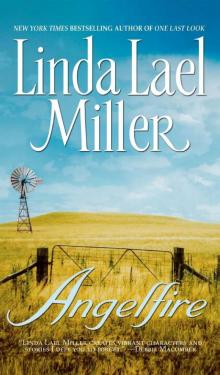 Angelfire
Angelfire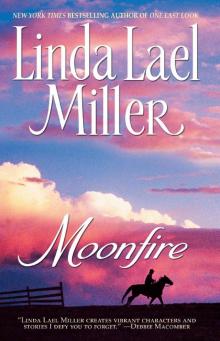 Moonfire
Moonfire The Yankee Widow
The Yankee Widow The Cowboy Way
The Cowboy Way Country Strong--A Novel
Country Strong--A Novel Forever and a Day
Forever and a Day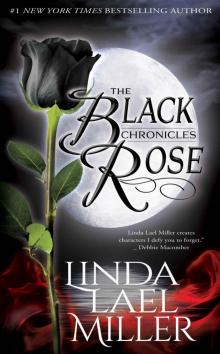 The Black Rose Chronicles
The Black Rose Chronicles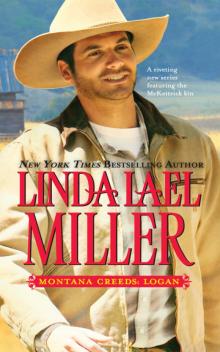 Montana Creeds: Logan
Montana Creeds: Logan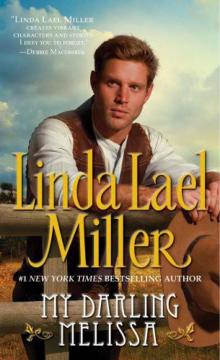 My Darling Melissa
My Darling Melissa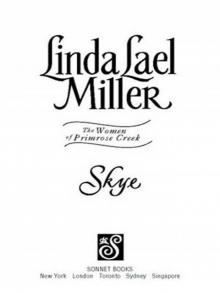 Skye
Skye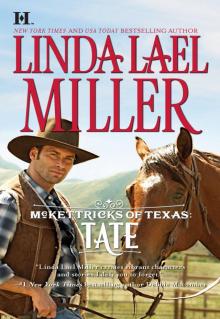 McKettricks of Texas: Tate
McKettricks of Texas: Tate Springwater Seasons
Springwater Seasons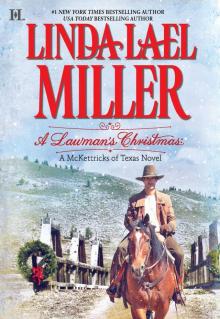 A Lawman's Christmas
A Lawman's Christmas Sierra's Homecoming
Sierra's Homecoming![Parable, Montana [4] Big Sky Summer Read online](http://i1.bookreadfree.com/i/03/22/parable_montana_4_big_sky_summer_preview.jpg) Parable, Montana [4] Big Sky Summer
Parable, Montana [4] Big Sky Summer One Last Weekend
One Last Weekend A Stone Creek Collection, Volume 2
A Stone Creek Collection, Volume 2 Tonight and Always
Tonight and Always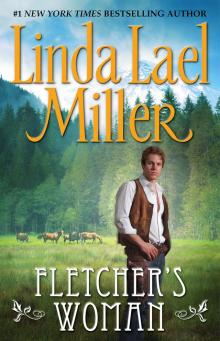 Fletcher's Woman
Fletcher's Woman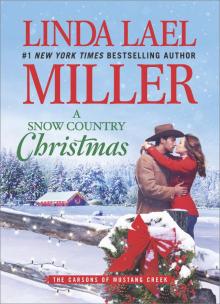 A Snow Country Christmas
A Snow Country Christmas The Last Chance Cafe
The Last Chance Cafe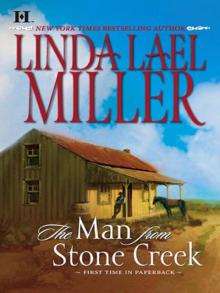 The Man from Stone Creek
The Man from Stone Creek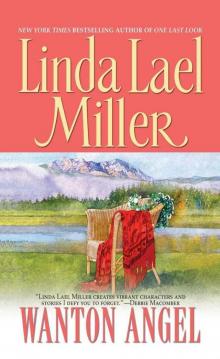 Wanton Angel
Wanton Angel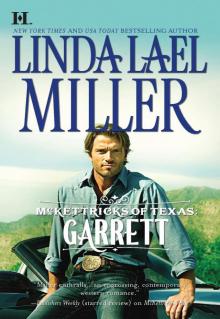 McKettricks of Texas: Garrett
McKettricks of Texas: Garrett Memory's Embrace
Memory's Embrace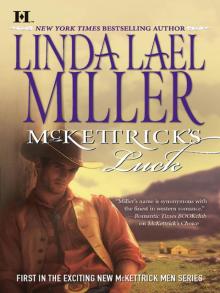 McKettrick's Luck
McKettrick's Luck Pirates
Pirates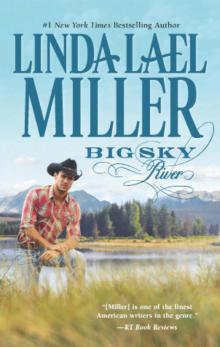 Big Sky River
Big Sky River Willow: A Novel (No Series)
Willow: A Novel (No Series)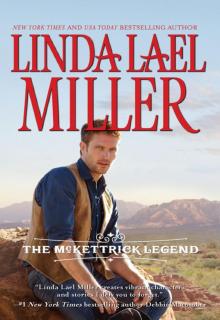 The McKettrick Legend: Sierra's HomecomingThe McKettrick Way (Hqn)
The McKettrick Legend: Sierra's HomecomingThe McKettrick Way (Hqn) Glory, Glory: Snowbound with the Bodyguard
Glory, Glory: Snowbound with the Bodyguard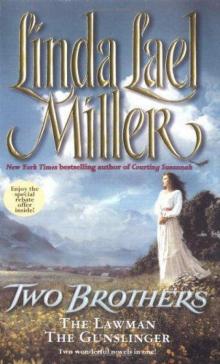 Two Brothers
Two Brothers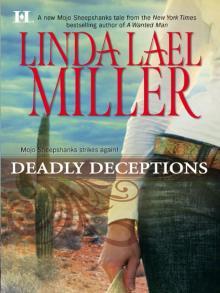 Deadly Deceptions
Deadly Deceptions Big Sky Secrets
Big Sky Secrets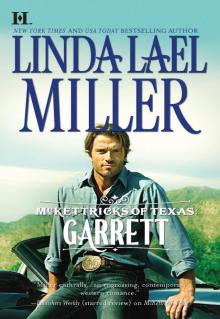 Garrett
Garrett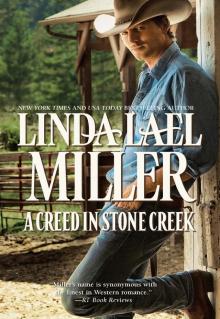 A Creed in Stone Creek
A Creed in Stone Creek Megan
Megan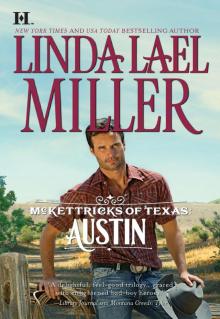 McKettricks of Texas: Austin
McKettricks of Texas: Austin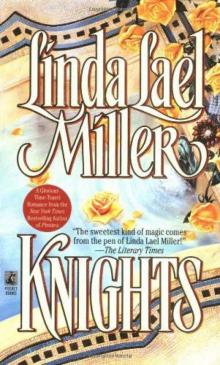 Knights
Knights High Country Bride
High Country Bride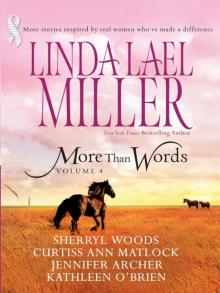 More Than Words Volume 4
More Than Words Volume 4 Glory, Glory
Glory, Glory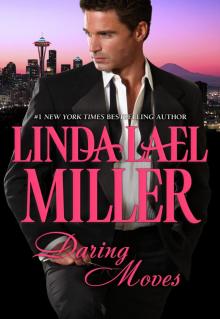 Daring Moves
Daring Moves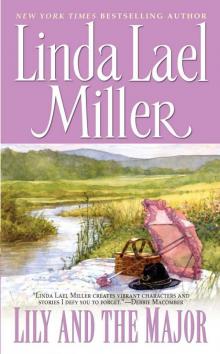 Lily and the Major
Lily and the Major Courting Susannah
Courting Susannah Banner O'Brien
Banner O'Brien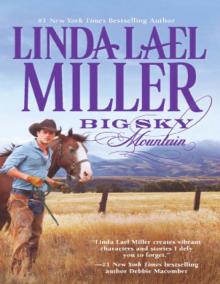 Big Sky Mountain
Big Sky Mountain Linda Lael Miller Bundle
Linda Lael Miller Bundle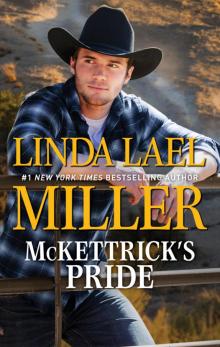 McKettrick's Pride
McKettrick's Pride A Stone Creek Collection Volume 1
A Stone Creek Collection Volume 1 A Wanted Man
A Wanted Man Big Sky Country
Big Sky Country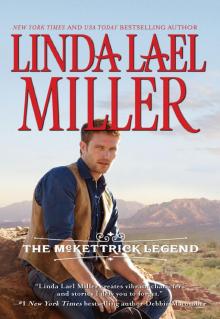 The McKettrick Legend
The McKettrick Legend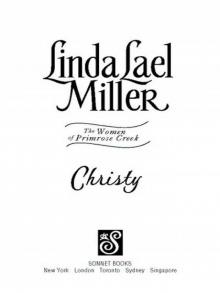 Christy
Christy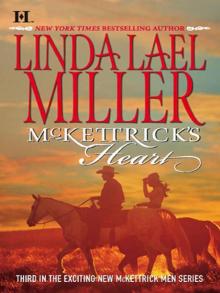 McKettrick's Heart
McKettrick's Heart Resurrection
Resurrection Arizona Heat
Arizona Heat Secondhand Bride
Secondhand Bride Snowflakes on the Sea
Snowflakes on the Sea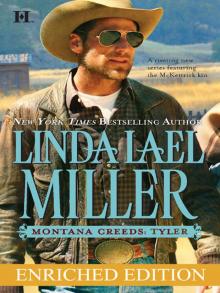 Montana Creeds: Tyler
Montana Creeds: Tyler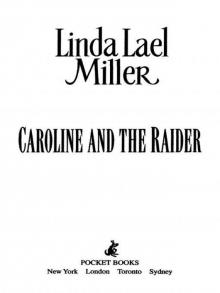 CAROLINE AND THE RAIDER
CAROLINE AND THE RAIDER A Proposal for Christmas: State SecretsThe Five Days of Christmas
A Proposal for Christmas: State SecretsThe Five Days of Christmas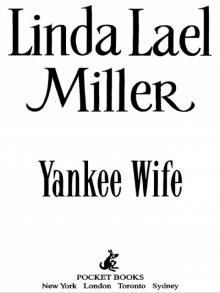 Yankee Wife
Yankee Wife Linda Lael Miller Montana Creeds Series Volume 1: Montana Creeds: LoganMontana Creeds: DylanMontana Creeds: Tyler
Linda Lael Miller Montana Creeds Series Volume 1: Montana Creeds: LoganMontana Creeds: DylanMontana Creeds: Tyler The Christmas Brides
The Christmas Brides McKettricks Bundle
McKettricks Bundle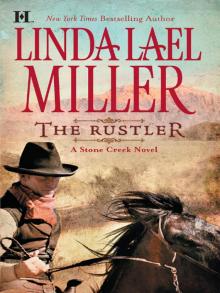 The Rustler
The Rustler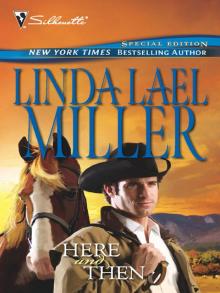 Here and Then
Here and Then Only Forever
Only Forever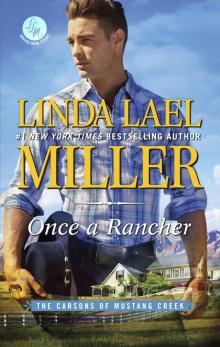 Once a Rancher
Once a Rancher The 24 Days of Christmas
The 24 Days of Christmas Big Sky Wedding
Big Sky Wedding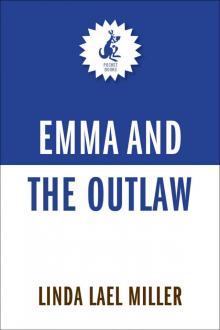 Emma and the Outlaw
Emma and the Outlaw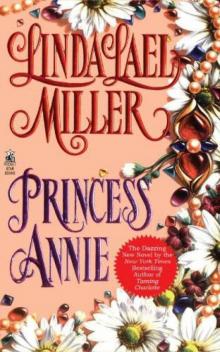 Princess Annie
Princess Annie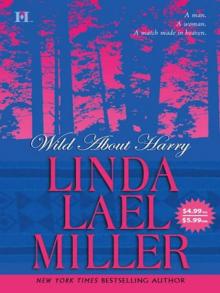 Wild About Harry
Wild About Harry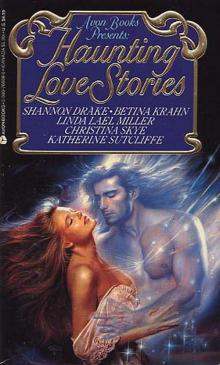 That Other Katherine
That Other Katherine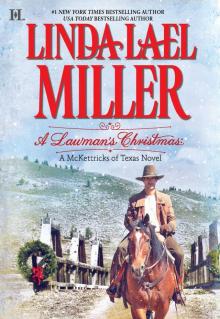 A Lawman's Christmas: A McKettricks of Texas Novel
A Lawman's Christmas: A McKettricks of Texas Novel Just Kate: His Only Wife (Bestselling Author Collection)
Just Kate: His Only Wife (Bestselling Author Collection)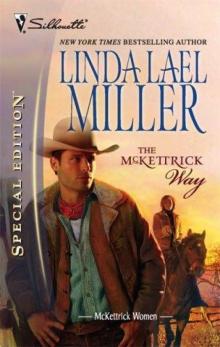 The McKettrick Way
The McKettrick Way Part of the Bargain
Part of the Bargain Taming Charlotte
Taming Charlotte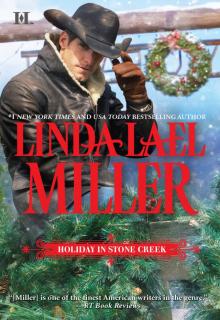 Holiday in Stone Creek
Holiday in Stone Creek One Last Look
One Last Look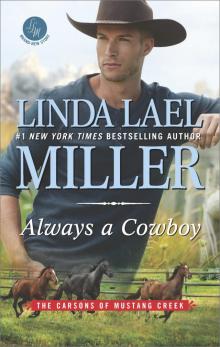 Always a Cowboy
Always a Cowboy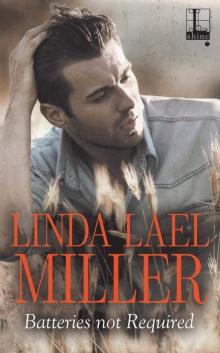 Batteries Not Required
Batteries Not Required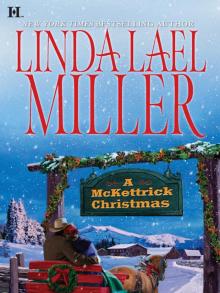 A McKettrick Christmas
A McKettrick Christmas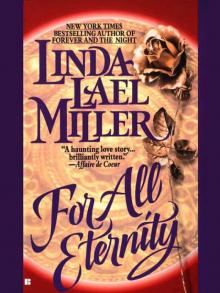 For All Eternity
For All Eternity The Marriage Season
The Marriage Season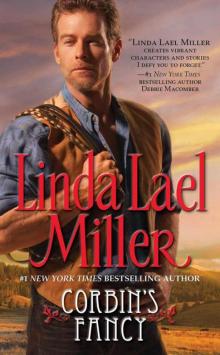 Corbin's Fancy
Corbin's Fancy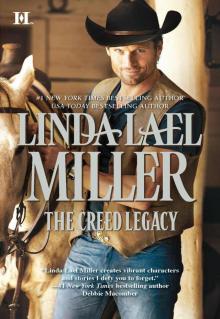 The Creed Legacy
The Creed Legacy Springwater Wedding
Springwater Wedding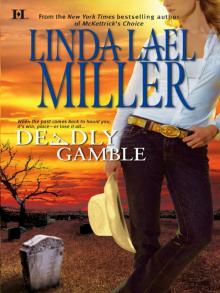 Deadly Gamble
Deadly Gamble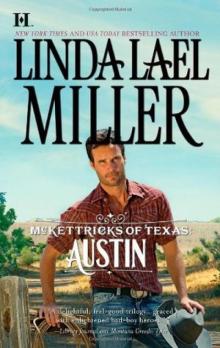 Austin
Austin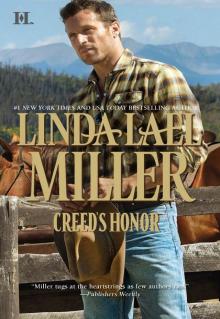 Creed's Honor
Creed's Honor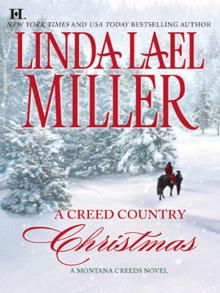 A Creed Country Christmas
A Creed Country Christmas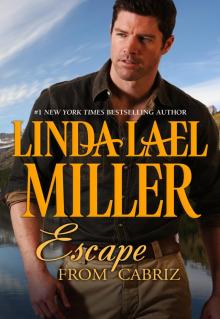 Escape from Cabriz
Escape from Cabriz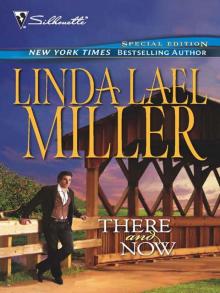 There and Now
There and Now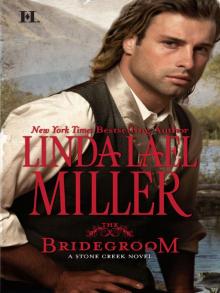 The Bridegroom
The Bridegroom State Secrets
State Secrets Bridget
Bridget